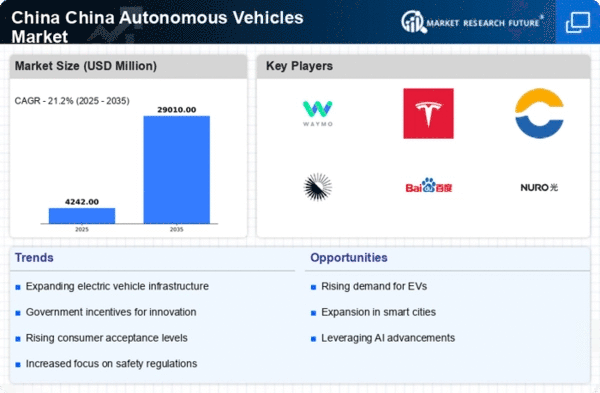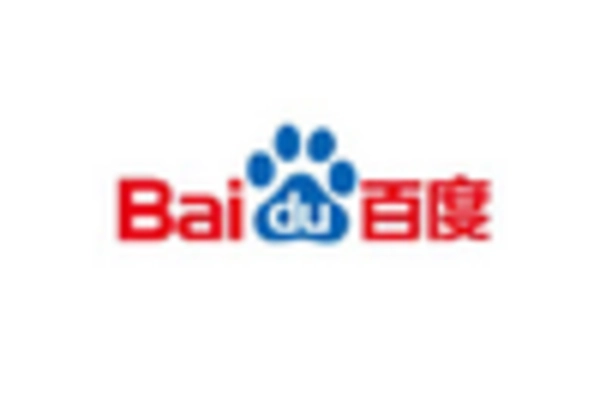Investment in Infrastructure
China's commitment to enhancing its infrastructure is a pivotal driver for the autonomous vehicles market. The government is investing heavily in smart road systems and vehicle-to-everything (V2X) communication technologies. These advancements are expected to create a conducive environment for autonomous vehicles to operate efficiently. Reports indicate that investments in smart infrastructure could exceed $100 billion by 2025, significantly impacting the market's growth trajectory. Improved road conditions and integrated traffic management systems will likely reduce accidents and enhance the overall safety of autonomous vehicles, making them more appealing to consumers and businesses alike.
Consumer Awareness and Education
As awareness of autonomous vehicles grows, consumer education plays a crucial role in shaping the market in China. Initiatives aimed at informing the public about the benefits and safety of autonomous technologies are essential for fostering acceptance. Surveys indicate that approximately 70% of consumers express interest in using autonomous vehicles, provided they receive adequate information regarding safety and functionality. This growing interest is likely to encourage manufacturers to invest in marketing and educational campaigns, further driving market growth. The autonomous vehicles market could see a significant increase in adoption rates as consumers become more informed and confident in the technology.
Regulatory Framework Enhancements
The regulatory landscape in China is evolving to support the autonomous vehicles market. The government has introduced new policies aimed at fostering innovation while ensuring safety. For instance, the Ministry of Industry and Information Technology has been actively working on guidelines that facilitate testing and deployment of autonomous vehicles. This regulatory support is crucial as it provides a structured environment for manufacturers and developers. The anticipated growth in the market is expected to reach approximately $60 billion by 2030, driven by these favorable regulations. Furthermore, the establishment of dedicated testing zones across major cities enhances the practical application of autonomous technologies, thereby accelerating market penetration.
Rising Demand for Mobility Solutions
The increasing urbanization in China is driving the demand for innovative mobility solutions, thereby impacting the autonomous vehicles market. As cities become more congested, traditional transportation methods are proving inadequate. Autonomous vehicles offer a potential solution to alleviate traffic congestion and provide efficient transportation options. Market analysis suggests that the demand for shared autonomous mobility services could grow by over 30% annually in urban areas. This shift towards shared mobility is likely to attract investments from both public and private sectors, further propelling the market forward. The integration of autonomous vehicles into public transport systems may also enhance accessibility for underserved populations.
Technological Collaborations and Partnerships
Collaborations between technology firms and automotive manufacturers are becoming increasingly prevalent in China, significantly influencing the autonomous vehicles market. These partnerships aim to leverage expertise in artificial intelligence, machine learning, and sensor technologies to enhance vehicle capabilities. For instance, major automotive companies are joining forces with tech giants to develop advanced driver-assistance systems. Such collaborations are expected to accelerate innovation and reduce time-to-market for new autonomous solutions. The market could witness a surge in new entrants, with projections indicating that the number of autonomous vehicle models could double by 2027, driven by these strategic alliances.















